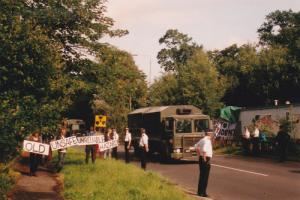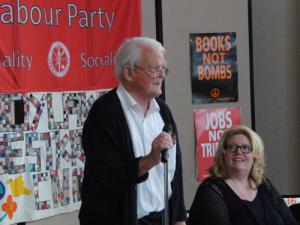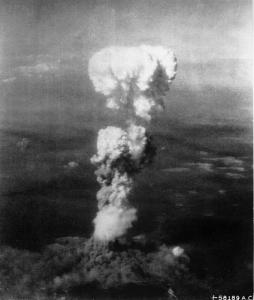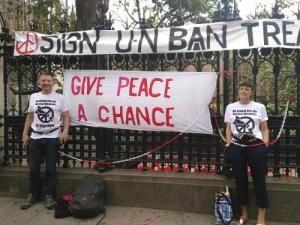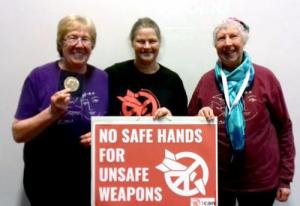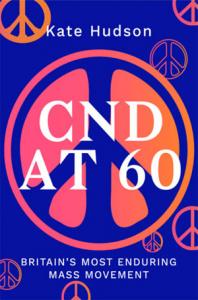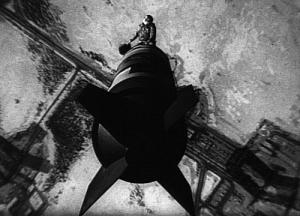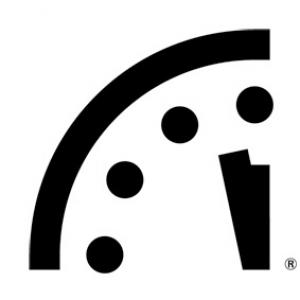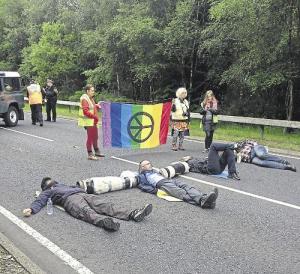In the mid-1980s, Faslane Peace Campers in Scotland began noticing big military convoys which passed by them on a regular basis. They worked out that these unique vehicles, the strangely-shaped eight-wheeler ‘Mammoth Majors’, were delivering nuclear warheads to the armaments depot at Coulport on Loch Long just over the hill from Faslane.
At the time, there was very little public…
Nuclear weapons
It was a warm and sunny afternoon on 9 June but the church was packed.
The speakers were Paul Davies, standing in to explain current Labour Party policy in the absence of a Labour MP or union official prepared to defend it, and Bruce Kent presenting the opposing view.
It turned out to be an ‘unbalanced’ meeting because there did not seem to be anyone in…
In July 1945, US president Harry S Truman had two powerful options his advisors believed could end the Pacific war – apart from a bloody US land invasion of Japan, or the use of nuclear weapons.
One was a Russian declaration of war. The other was to allow the Japanese emperor to keep his throne, despite his war crimes.
Truman refused to try either of these options before using the atom bomb.
Russia
On 8 July, the top-level US-UK…
At 1.30pm on 20 June, while Britain's Westminster parliament was sitting inside, 60 activists from across the UK chained themselves to the railings outside the houses of parliament in central London. They are calling for the UK to sign the Treaty on the Prohibition of Nuclear Weapons (TPNW) and disarm the Trident nuclear weapon system.
This action echoes similar actions by women’s suffrage campaigners 100 years ago.
The activists from the campaign group Trident Ploughshares…
We decided to celebrate the Campaign for Nuclear Disarmament’s 60th anniversary with a profile of one of its regional branches. The Yorkshire CND office is in Bradford, opposite the university. One of the branch’s contributions to the peace movement is its fundraising ‘Day of Dance’, which in Saltaire this April had 30 workshops at the event’s 46th outing. Benjamin Kaplan (BK) interviewed Matt Fawcett (MF) of Yorkshire CND more generally, on behalf of PN.
BK: How did Yorkshire CND…
'We need to recognise that we can change the debate in this country and this treaty gives us the means to do so' said Rebecca Johnson on 7 April, at a WILPF UK training day on realising the UN Treaty on the Prohibition of Nuclear Weapons (TPNW). Dr Johnson is a member of the British branch of the Women's International League for Peace and Freedom (WILPF UK) and founding…
CND Cymru
CND Cymru is the center of the Welsh anti-nuclear movement. Before it was established in 1981, the Welsh branch of the CND was made up of a collection of smaller groups spread out across the region. This network of local associations shared a commitment to decreasing the significant role of nuclear power and nuclear proliferation in Wales through mass protest of local nuclear power plants and loud opposition to military campaigns. In the last…
One of the key debates in CND from its inception was the role of ‘direct action’ and whether breaking the law was a permissible way of campaigning against nuclear weapons.
The first Aldermaston march in April 1958, which was organised by the Direct Action Committee (DAC) and supported by CND, really launched the new movement into the public eye and onto the political agenda. CND went on after the march to pursue a range of campaigning and lobbying activities, building local groups…
Daniel Ellsberg is famous as the Pentagon analyst who leaked thousands of pages of top secret…
Nukewatch report that the first British nuclear warhead convoy of 2018 took a new route from the nuclear bomb factory in Burghfield in Berkshire, England, to the Coulport nuclear weapons store north of Glasgow, Scotland.
Four warhead carriers left Burghfield on 31 January. After a break at Glencorse Barracks, south of Edinburgh, the convoy departed from its usual route: ‘Unusually it then took the M8 west passing Livingston and Bathgate, and then through the centre of Glasgow…
A new, aggressive US nuclear posture review was released on 2 February. The review advises removing restrictions on the use of nuclear weapons, as well as the development of new low-yield, or tactical, warheads.
The US is looking to add a number of long-range weapons to its arsenal, with accompanying sea/air-based delivery systems. One is a modified Trident D5 submarine-launched missile that can be equipped with either a conventional or a low-yield nuclear warhead. These less-…
On 25 January, Rachel Bronson, president and CEO of the Bulletin of the Atomic Scientists, announced: ‘Because of the extraordinary danger of the current moment, the Science and Security Board [of the Bulletin] today moves the minute hand of the Doomsday Clock 30 seconds closer to catastrophe. It is now two minutes to midnight – the closest the clock has ever been to Doomsday, and as close as it was in 1953, at the height of the Cold War.’
The central concern of the…
On 24 January, Peter Anderson and Jamie Watson were both found guilty of ‘breach of the peace’ at Dumbarton justice of the peace court for blockading the Coulport nuclear weapons store during the Trident Ploughshares summer disarmament camp last July.
Two Finns who were arrested and charged with them, Esa Noresvuo and Kaj Raninen, did not turn up. Peter and Jamie accepted prosecution evidence that none of the four who locked-on across an access road to Coulport had moved when asked to…
Three members of Nukewatch UK briefly stopped a convoy carrying nuclear bombs on 16 November. The vehicles were leaving a base near Bannockburn on their way from Atomic Weapons Establishment Burghfield to the royal naval arms depot at Coulport near Helensburgh where the warheads are loaded onto Trident submarines.
…On 6 October, the Norwegian Nobel committee awarded the Nobel Peace Prize for 2017 to the International Campaign to Abolish Nuclear Weapons (ICAN). Executive director Beatrice Fihn laughed in disbelief when the committee rang to inform her.
ICAN was awarded the prize for drawing attention to the catastrophic humanitarian consequences of any use of nuclear weapons, and for its work on a nuclear…


